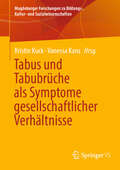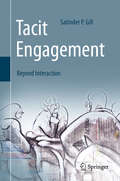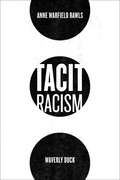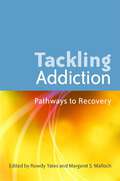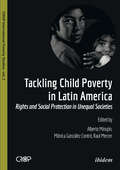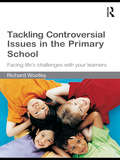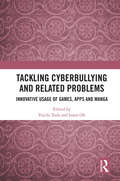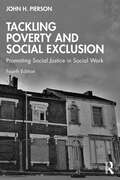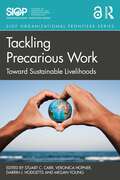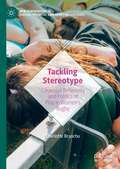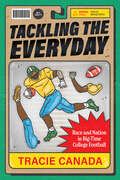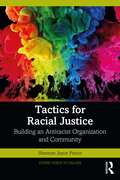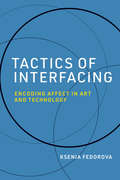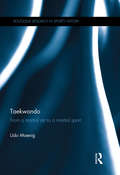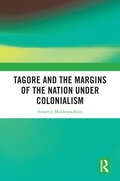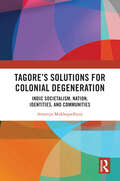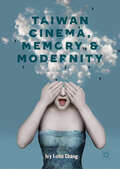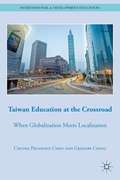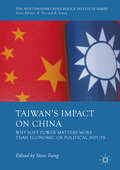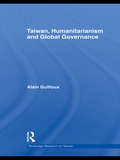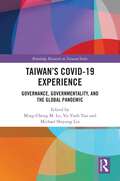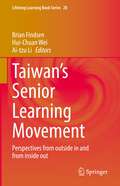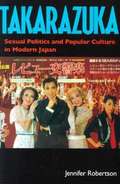- Table View
- List View
Tabus und Tabubrüche als Symptome gesellschaftlicher Verhältnisse (Magdeburger Forschungen zu Bildungs-, Kultur- und Sozialwissenschaften)
by Kristin Kuck Vanessa KanzDer Sammelband behandelt aus den Perspektiven der Kultur- und Gesellschaftswissenschaften das Phänomen Tabu und seine vielseitigen Ausprägungen schwerpunktmäßig in der zeitgenössischen europäischen Gesellschaft. Zwar entstammt das Konzept selbst den polynesischen Gesellschaften, die durch Seefahrer im 18. Jahrhundert entdeckt wurden, aber durch Missionsbewegungen in der Ferne, Romantisierungen in der Heimat und die europäische Aufklärung entwickelte sich ein ganz eigenes Tabukonzept in Europa, das bis heute starke sozial ordnende Effekte hat. Tabus legen fest, was von Mitgliedern einer Gruppe an Gedanken, Handlungen, Gefühlen und Themen zugelassen wird und was nicht, und gleichzeitig sind Tabubehauptungen und Tabubrüche auch Thematisierungsstrategien. Der Band folgt daher der These, dass Tabugrenzen nicht nur stetig ausgehandelt werden, sondern auch als soziale Konstrukte gesellschaftliche Verhältnisse wiederspiegeln. Enttabuisierungsbestrebungen, beispielsweise in Bezug auf psychische Krankheiten oder auf die Kommunikation von Gewalterfahrungen werden heutzutage oft mit Hochwertkonzepten wie Selbstbestimmung, Diversität und Gleichberechtigung legitimiert. Gleichzeitig verschärfen sich auch Tabugrenzen, wenn es z. B. um die Stigmatisierung von Diskriminierung geht. Veränderungen in den Tabugrenzen sind also nicht zufällig, sondern Ausdruck von gesellschaftlichen Verhältnissen und Entwicklungen. Die Beiträge werfen aus den verschiedenen Perspektiven verschiedener kultur- und gesellschaftswissenschaftlicher Fächer Schlaglichter auf Forschungen, die mit Tabus umgehen und umgehen müssen. Sie geben so einen Einblick in aktuelle Aushandlungen zwischen dem Tabuisierten und dem Nicht-(Mehr)-Tabuisierten.
Tacit Engagement
by Satinder P. GillThis book explores how digital technology is altering the relationships between people and how the very nature of interface itself needs to be reconsidered to reflect this - how we can make sense of each other, handle ambiguities, negotiate differences, empathise and collectively make skilled judgments in our modern society. The author presents new directions for research at the relational-transactional intersection of contrasting disciplines of arts, science and technology, and in so doing, presents philosophical and artistic questions for future research on human connectivity in our digital age. The book presents frameworks and methods for conducting research and study of tacit engagement that includes ethnography, experiments, discourse analysis, gesture analysis, psycholinguistic analysis, artistic experiments, installations, and improvisation. Case studies illustrate the use of various methods and the application and emergence of frameworks. Tacit Engagement will be of interest to researchers, designers, teachers and students concerned with new media, social media and communications networks; interactive interfaces, including information systems, knowledge management, robotics, and presence technologies. Not since Michael Polanyi have we seen such wise science about the tacit: how we know more than we can tell. Gill brings to the present era of design and data a profoundly needed perspective on meaning that comes from social dialogue, skilled performance, relational gesture and rhythm. - Sha Xin Wei, Ph. D. (Synthesis, ASU)
Tacit Racism
by Waverly Duck Anne Warfield RawlsWe need to talk about racism before it destroys our democracy. And that conversation needs to start with an acknowledgement that racism is coded into even the most ordinary interactions. Every time we interact with another human being, we unconsciously draw on a set of expectations to guide us through the encounter. What many of us in the United States—especially white people—do not recognize is that centuries of institutional racism have inescapably molded those expectations. This leads us to act with implicit biases that can shape everything from how we greet our neighbors to whether we take a second look at a resume. This is tacit racism, and it is one of the most pernicious threats to our nation. In Tacit Racism, Anne Warfield Rawls and Waverly Duck illustrate the many ways in which racism is coded into the everyday social expectations of Americans, in what they call Interaction Orders of Race. They argue that these interactions can produce racial inequality, whether the people involved are aware of it or not, and that by overlooking tacit racism in favor of the fiction of a “color-blind” nation, we are harming not only our society’s most disadvantaged—but endangering the society itself. Ultimately, by exposing this legacy of racism in ordinary social interactions, Rawls and Duck hope to stop us from merely pretending we are a democratic society and show us how we can truly become one.
Tackling Addiction
by Rowdy Yates Margaret S. MallochThe issue of 'recovery' has been increasingly prioritised by policymakers in recent years, but the meaning of the concept remains ambiguous. This edited collection brings together the thoughts and experiences of researchers, practitioners and service users from the fields of health, addiction and criminal justice and centres on current developments in addiction policy and practice. Tackling Addiction examines what recovery, addiction and dependence really mean, not only to the professional involved in rehabilitation but also to each individual client, and how 'coerced treatment' fails to take account of recovery as a long-term and ongoing process. Chapters cover the influence of crime and public health in UK drug policy; the ongoing emphasis on substitute prescribing; the role of recovery groups and communities; and gendered differences in the recovery process and implications for responses aimed at supporting women. Tackling Addiction will be essential reading for practitioners, researchers, policy makers and students in the fields of addiction, social care, psychology and criminal justice.
Tackling Child Poverty in Latin America: Rights and Social Protection in Unequal Societies (CROP International Poverty Studies #2)
by Alberto Minujin Mónica González Contró Raul MercerThis book highlights current debates about concepts, methods, and policies related to poverty in Latin America. It focuses on child and adolescent well-being and the issue of inclusive societies. Its goal is to promote new and critical thinking about these issues globally and in Latin America. The authors emphasize the need to develop new conceptual and practical avenues that can address the issues of poverty, marginalization, exclusion, and old and new inequalities in post-neoliberal times. The objective is to advance the rights of all children and adolescents in the region. This urgent book represents a unique opportunity for practitioners, policy makers, researchers, and students to get access to the most up-to-date perspectives on child poverty and inequality from a conceptual and practical point of view.
Tackling Controversial Issues in the Primary School: Facing Life's Challenges with Your Learners
by Richard WoolleyHow do you broach family values with seven year olds? Can you help young children understand racism? Can you avoid bringing your own prejudices into the classroom? Talking effectively about controversial issues with young children is a challenge facing every primary school teacher. Tackling Controversial Issues in the Primary School provides teachers with support and guidance as you engage with the more tricky questions and topics you and your pupils encounter. Illuminated with case studies and examples of how teachers and children have confronted issues together, this book helps you understand your own perspectives and provides fresh approaches for the primary classroom. It considers how best to work with parents and carers, whole-school policies for tackling issues, and ideas for circle time, setting up international links, school councils and buddying systems. The range of challenging topics covered includes: family values racism in mono and multi-cultural settings democracy and citizenship the environment and sustainability consumerism, finances and media advertising gender, health and identity grief and loss. For all student and practising primary teachers, Tackling Controversial Issues in the Primary School provides much needed support as you help your learners face complicated ideas, find their voice and get involved in the issues that they feel make a difference.
Tackling Cyberbullying and Related Problems: Innovative Usage of Games, Apps and Manga
by Toda, Yuichi / Oh, InsooThis book looks at innovative tools developed by Japanese and Korean researchers and practitioners to tackle cyberbullying and internet-related problems (addiction, cybercrimes, etc.). The contributors have created preventative and intervention measures for children using games, apps, manga and anime videos, which are more accessible for children than textbooks or classroom-based lessons. The contributors cover their experiences of developing these new approaches with children, parents and teachers as well as giving insights and evidence into how these innovative techniques and methods work. By sharing their expertise, the authors hope to contribute to further improvements of games, apps, manga and anime and to improve the safety of children online.
Tackling Poverty and Social Exclusion: Promoting Social Justice in Social Work
by John H. PiersonIn highly unequal Britain, poverty and social exclusion continue to dominate the lives of users of social work and social care services. At the same time, years of austerity combined with welfare reform have changed the context in which services are delivered in a society roiled by Brexit, Covid, Black Lives Matter and women rallying under the banner, “Me‑too”.This fourth edition lays out the ways and means for practitioners to tackle the deprivation and destitution of service users. Fully revised and expanded, it introduces new material that tracks changes and developments in policy and practice. Statutes, benefit rules and relevant research are discussed as part of the necessary knowledge base for practitioners. Greater attention than in previous editions is paid to: local authority commissioning, the impact of social media on the mental health of young people, substandard housing and working with transgender youth.Preparing practitioners to engage directly with the social and personal circumstances facing excluded individuals and their families, this book explains the development of the concept of social exclusion as a framework for understanding the impact of poverty and other deprivations in users’ lives, and locates that framework within social work values of social justice while acknowledging the many challenges to those values. The focus is on practice throughout with boxed extracts from key policies and guidelines along with questions for readers to ponder through up‑to‑date examples, activities and exercises in each chapter. Case studies from public, private and voluntary sectors are drawn from across the United Kingdom, to illuminate the way forward for poverty‑aware social work.Tackling Poverty and Social Exclusion will be required reading for all BA and MA social work degrees across the United Kingdom.
Tackling Precarious Work: Toward Sustainable Livelihoods (SIOP Organizational Frontiers Series)
by Stuart C. Carr Veronica Hopner Darrin J. Hodgetts Megan YoungTackling precarious work has been described by the United Nations (UN)’s International Labour Organization (ILO) as the main challenge facing the world of work. In this ground-breaking book, leading applied research scholars, advocates, and activists from across the globe respond to this challenge by showing how Industrial and Organizational (I/O) psychology has a significant contribution to make in humanity moving away from precarious work situations towards sustainable livelihoods. Broken down into four key parts on Sustainable Livelihoods, Fair Incomes, Work Security and Social Protection, the book covers a multitude of topics including the role of poor pay, lack of work-related security, social protection for human health and wellbeing, and interventions and policies to implement for the future of work. The volume offers a detailed look into useful and effective ways to tackle precarious work to create and maintain sustainable livelihoods. This curated collection of 22 chapters considers the broader relationships between previous research work and issues of human security and sustainability that affect workers, families, communities, and societies. Each chapter expands the present understandings of the world of precarious work and how it fits within broader issues of economic, ecological, and social sustainability. In addition to I/O psychologists in research, practice, service and study, this book will also be useful for organizational researchers, labor unions, HR practitioners, fair trade, cooperative, and civil society organizations, social scientists, human security analysts, public health professionals, economists, and supporters of the UN SDGs, including at the UN.
Tackling Rugby
by Allyson PollockOn 29 January 2011, Benjamin Robinson was playing rugby for his school. During the match he sustained a concussion but was not taken off, and was allowed to continue with the game, in which he endured a second impact. When play ended, he collapsed, dying two days later as a result of his injuries. Every week young children are hospitalized on the playing fields of Britain. Yet the subject is rarely investigated, injury data are not systematically collected, and as a result any real attempt to work out how to make youth rugby safer is flawed. Using meticulous, peer-reviewed research, leading public health specialist Allyson M. Pollock sets out the true risks associated with the sport, raising uncomfortable questions for politicians and the educational authorities.From the Trade Paperback edition.
Tackling Stereotype: Corporeal Reflexivity and Politics of Play in Women’s Rugby (New Femininities in Digital, Physical and Sporting Cultures)
by Charlotte BranchuThis book presents a critical rethinking of assumptions that have informed our understanding of women’s engagement in contact sport, based on an in-depth ethnography with an English rugby team. Looking at the day-to-day concerns of women who play rugby, this work provides a refreshing perspective on different ways of doing femininities in postfeminist times. Women’s rugby is one of the world’s fastest growing sports, yet it is also a physical game that is traditionally the preserve of men. Tackling Stereotypes reveals the cultural and symbolic stigma that ‘sticks’ to women’s rugby players and the tactics they use to carve out space for themselves and fight for legitimacy. It also argues that players engage in pragmatic politics, informed by their participation, that aims to enact realistic change. Branchu develops a situational sociology that furthers debates in the understanding of gender, belonging, becoming, embodiment, resistance politics, and the sociological study of sport.
Tackling the Everyday: Race and Nation in Big-Time College Football (Atelier: Ethnographic Inquiry in the Twenty-First Century #19)
by Tracie CanadaA Black feminist take on exploitation and care in America's favorite game. Big-time college football promises prestige, drama, media attention, and money. Yet most athletes in this unpaid, amateur system encounter a different reality, facing dangerous injuries, few pro-career opportunities, a free but devalued college education, and future financial instability. In one of the first ethnographies about Black college football players, anthropologist Tracie Canada reveals the ways young athletes strategically resist the exploitative systems that structure their everyday lives.Tackling the Everyday shows how college football particularly harms the young Black men who are overrepresented on gridirons across the country. Although coaches and universities constantly invoke the misleading "football family" narrative, this book describes how a brotherhood among Black players operates alongside their caring mothers, who support them on and off the field. With a Black feminist approach—one that highlights often-overlooked voices—Canada exposes how race, gender, kinship, and care shape the lives of the young athletes who shoulder America's favorite game.
Tactics for Racial Justice: Building an Antiracist Organization and Community (Giving Voice to Values)
by Shannon Joyce PrinceThis is not a book of antiracist theory but antiracist tactics – tactics that anyone, of any race, can use to strike a blow against injustice. Antiracism is not about what we feel but what we do, and there are specific techniques we can use to create a just world. Antiracist strategies are skills that can be learned just as we learn skills for public speaking or hitting a baseball. In these pages, you – whether a person of color or white – will find a playbook for leading your workplace, organization, or community through transformative change in the wake of an act of explicit racism. You’ll learn to play antiracist rhetorical chess, and to anticipate and effectively respond to the discursive moves of people who don’t understand bigotry, aren’t aware of it, are in denial of it, or even actively uphold it – so that you can advance justice goals. You’ll get a blueprint of how to dismantle systemic racism community by community, workplace by workplace, and organization by organization – and examples of what not to do. This book is aimed at people who are conscious of the reality of racism and want to end it but may not know how. It clearly shows how anyone can make an effective, significant, and measurable impact on racism through strategic action.
Tactics of Interfacing: Encoding Affect in Art and Technology (Leonardo)
by Ksenia FedorovaHow digital technologies affect the way we conceive of the self and its relation to the world, considered through the lens of media art practices.In Tactics of Interfacing, Ksenia Fedorova explores how digital technologies affect the way we conceive of the self and its relation to the world. With the advent of ubiquitous computing, the self becomes an object of technological application, increasingly defined by data received from tracking technologies. Subtly, these technologies encourage versions of ourselves that are easier to interpret computationally. Fedorova views these shifts in self-perception through the lens of contemporary media art practices, examining a range of artistic tactics that enable embodied and intimate experiences of machinic operations on our lives.
Taekwondo: From a Martial Art to a Martial Sport (Routledge Research in Sports History)
by Udo MoenigThis book provides a comprehensive overview of the historical, political, and technical evolution of taekwondo. Many of the supposedly ‘traditional’ and ‘ancient’ Korean cultural elements attached to taekwondo are, in fact, remnants of East Asia’s modernization drive, and largely inherited from the Japanese martial arts. The current historical portrayal has created an obstacle to a clear understanding of the history of taekwondo, and presents problems and contradictions in philosophy and training methodology. Using rich empirical data, including interviews with leading figures in the field, this book brings together martial arts philosophy with an analysis of the technical aspects and the development of taekwondo, and provides a detailed comparison of karate and taekwondo techniques. It debunks nationalistic mythology surrounding taekwondo to provide a reinterpretation of taekwondo’s evolution.
Tagore and the Margins of the Nation under Colonialism
by Amartya MukhopadhyayThis book focuses on India’s anti-colonial politics which Rabindranath Tagore (1861–1941) brought into the mainstream of nationalist thinking. It browses through the entire corpus of Tagore’s writings in the genres of poetry, fiction, and essays, to glean both used and hitherto unused/un-translated writings that illumine Tagore’s gender consciousness and (proto)feminist thought and empathy, presenting it in a wholly new light. It teases out Tagore’s original views on India’s industrial-capitalist development and his views on the roles of applied scientists and engineers in it to highlight his critique of the nature of science teaching in colonial India. The volume also delineates Tagore’s Upanişadic ecologism that creatively evoked anticolonialism and patriotism. Lucid and topical, the book will be indispensable for students and researchers in the fields of comparative literature, history, political science, international relations, and sociology at all levels, and anybody interested in literary criticism and cultural studies.
Tagore’s Solutions for Colonial Degeneration: Indic Societalism, Nation, Identities, and Communities
by Amartya MukhopadhyayThis book focuses on Rabindranath Tagore as a social and political thinker revolving around Tagore’s ideas on the seeds of civil society, nation, identities, and communities in the Indic tradition. The author deconstructs Tagore’s concepts against the appropriate resurgent and triumphalist Western concepts in the updated Western social thought and theories. The book examines Tagore’s understanding of the nature of the civil social sphere in India and analyzes the relevance of his civil social concepts against the backdrop of colonialism in India. It also discusses his views on nation and nationalism in India and his insights into the problems and prospects of intercommunity, particularly Hindu-Muslim relations in India. Applying current social science and Western literature in an unprecedented manner to interpret Tagore, this book will be of great interest to scholars, teachers, and students of politics, nationalism, postcolonialism, history, comparative literature, sociology, religious studies, and South Asian studies.
Taiwan Cinema, Memory, and Modernity
by Ivy I-chu ChangThis book investigates the aesthetics and politics of Post/Taiwan-New-Cinema by examining fifteen movies by six directors and frequent award winners in international film festivals. The book considers the works of such prominent directors as Edward Yang, Tsai Ming-liang and Chang Tsuo-chi and their influence on Asian films, as well as emergent phenomenal directors such as Wei Te-sheng, Zero Chou, and Chung Mong-hong. It also explores the possibility of transnational and trans-local social sphere in the interstices of layered colonial legacies, nation-state domination, and global capitalism. Considering Taiwan cinema in the wake of globalization, it analyses how these films represent the socio-political transition among multiple colonial legacies, global capitalism, and the changing cross-strait relation between Taiwan and the Mainland China. The book discusses how these films represent nomadic urban middle class, displaced transnational migrant workers, roaming children and young gangsters, and explores how the continuity/disjuncture of globalization has not only carved into historical and personal memories and individual bodies, but also influenced the transnational production modes and marketing strategies of cinema.
Taiwan Education at the Crossroad
by Chuing Prudence Chou Gregory ChingChou and Ching examine the processes of schooling in Taiwan amidst social, cultural, economic, and political conflict resulting from local and global dilemmas. Collectively, these issues offer a panoramic and in-depth glimpse from the past to the future of educational trends in Taiwan.
Taiwan's Impact on China: Why Soft Power Matters More than Economic or Political Inputs (The Nottingham China Policy Institute Series)
by Steve TsangThis book is about the basis and scope of impact that Taiwan – a democracy with a population of around 23 million – has on China, the most powerful remaining Leninist state which claims sovereignty over Taiwan and has a population of over 1.3 billion. It examines how Taiwan has helped China in its economic transformation, but argues that the former exercises greatest influence through its soft power. The expert and timely contributions in this book demonstrate how Taiwan exerts real influence in China through admiration of its popular culture, be it in music or literature, as well as its reach into politics and economics. As mainland Chinese visit Taiwan, they are most impressed with civility in everyday living based on a modernized version of the traditional Chinese culture. However, discussions in the book also reveal the limits of Taiwan’s impact, as the Chinese government tightly controls the narrative about Taiwan and does not tolerate any Taiwanese posing a threat to its monopoly of power.
Taiwan, Humanitarianism and Global Governance (Routledge Research on Taiwan Series)
by Alain GuillouxIn this unique book, Alain Guilloux uses four major elements of governance - namely norms, actors, processes, and outcomes - to examine Taiwan’s national governance as well as its participation in global governance in relation to humanitarian aid. Including case studies on Taiwan’s application to become an observer to the WHO, and its foreign-aid policy and practice dealing with disease outbreaks and natural disasters, Guilloux explores the complexities and dilemmas of providing humanitarian aid to people in need and distress. Taking into account Taiwan's unclear status in the global arena, and how in its efforts Taiwan faces both international isolation and opposition from the People's Republic of China at multiple levels. Taiwan, Humanitarianism and Global Governance will be of interest for scholars of Chinese studies, Taiwan Studies, East Asian politics and International Relations, and environmental politics and humanitarian studies.
Taiwan’s COVID-19 Experience: Governance, Governmentality, and the Global Pandemic (Routledge Research on Taiwan Series)
by Yu-Yueh Tsai Michael Shiyung LiuThis book explores and develops the ongoing conversation about how Taiwan navigated through the COVID-19 pandemic.Emphasizing the themes of governance and governmentality, it moves the foci of the discussion from COVID policies to the social and political orders undergirding the statecraft of pandemic management. Furthermore, it analyzes how the pandemic fostered a historical moment at which new forms of governance and governmentality were beginning to take root. It also situates Taiwan’s precarious nationhood in its global context, thereby challenging a prevalent methodological nationalism – the assumption that the nation is a natural unit of analysis whose borders are more or less unquestioned – and contributing to decolonizing Western theories with perspectives from the Global South.Presenting rich original materials on the legal and public debates, individual reflections, and grassroots campaigns during COVID, this book will be essential reading for students and scholars of Taiwan's governance and social health policy, as well as medical anthropology and sociology.
Taiwan’s Senior Learning Movement: Perspectives from outside in and from inside out (Lifelong Learning Book Series #28)
by Brian Findsen Hui-Chuan Wei Ai-Tzu LiThis volume provides an in-depth analysis of historical and recent developments of senior learning in Taiwan, where publications in English have been scant. It takes a broader view on lifelong learning and active ageing from a theoretical/conceptual base written by prominent international authors- this represents the ‘outside in’ perspective. The ‘inside out’ on the other hand signifies an in-depth investigation of initiatives written by authors from Taiwan who are closely involved with developments in policy and practice. The volume is situated theoretically in the intersection of complementary concepts such as lifelong learning, active ageing, later life learning, learning communities and social movements. It is located geographically and culturally in East Asia where senior learning/education is expanding in response to large populations of older adults and concerns about their physical and social well-being. It is argued that Taiwan is leading the way in terms of innovation and community engagement in regard to older adult learning/education and can thus serve as a model for neighboring countries. By analyzing historical precedents, cultural dynamics, policy trends, research sub-fields and community engagement this book is of interest to both East Asian and Western scholars, practitioners, policy-makers and students amongst the fields of lifelong learning, social gerontology and educational psychology.
Takarazuka: Sexual Politics and Popular Culture in Modern Japan
by Jennifer E. RobertsonFounded in 1913 as a counterpart to the all-male Kabuki theater, the all-female Takarazuka Revue is world-famous today for its rococo musical productions and fanatically devoted fans. Anthropologist Jennifer Robertson draws from over a decade of research to explore how the Revue illuminates popular culture in 20th-century Japan. 29 photos.
Take Back Our Future: An Eventful Sociology of the Hong Kong Umbrella Movement
In a comprehensive and theoretically novel analysis, Take Back Our Future unveils the causes, processes, and implications of the 2014 seventy-nine-day occupation movement in Hong Kong known as the Umbrella Movement. The essays presented here by a team of experts with deep local knowledge ask: how and why had a world financial center known for its free-wheeling capitalism transformed into a hotbed of mass defiance and civic disobedience?Take Back Our Future argues that the Umbrella Movement was a response to China's internal colonization strategies—political disenfranchisement, economic subsumption, and identity reengineering—in post-handover Hong Kong. The contributors outline how this historic and transformative movement formulated new cultural categories and narratives, fueled the formation and expansion of civil society organizations and networks both for and against the regime, and spurred the regime's turn to repression and structural closure of dissent. Although the Umbrella Movement was fraught with internal tensions, Take Back Our Future demonstrates that the movement politicized a whole generation of people who had no prior experience in politics, fashioned new subjects and identities, and awakened popular consciousness.
